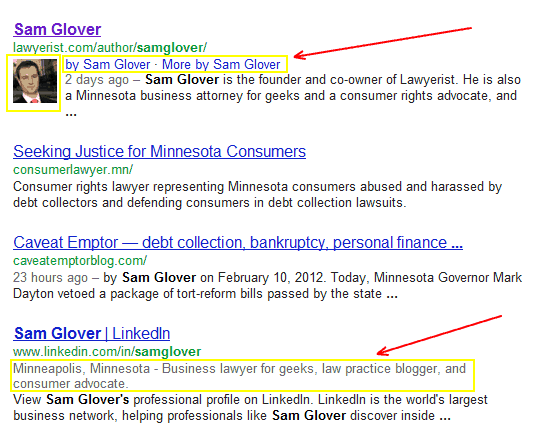Google recently updated its rich snippets guidelines. Which makes it as good a time as any to talk about how rich snippets and structured data markup will become increasingly important in the future.
Rich snippets are designed to summarize the content of a page in a way that makes it even easier for users to understand what the page is about in our search results. If you’re considering taking advantage of rich snippets, think about whether a user would find the information helpful when choosing between search results.
Right off-the-bat, we see that rich snippets are to be used to help users find information. Which implicitly means, don't try to spam results with rich snippets. They also can help search engines better understand your website.
For lawyers, probably the most popular example of a rich snippet is authorship markup.

Which, when used in the appropriate place (i.e. pages authored by the attorney) is a really nice way for users to find more pages authored by that attorney. Of course, as is the case with almost everything else "search" these authorship markup is being abused by attorneys. For example, some lawyers implement authorship on pages that they didn't author.
Review and rating markup is also commonly used by law firm sites and legal directories. Review information can help your users learn more about a particular lawyer, or more importantly, what other lawyers and clients think about the lawyer.

This is one reason why it's so important for lawyers to have a process for encouraging online reviews. Online reviews can be extremely useful to users looking for lawyers and pages containing review markup appear prominently in search results. In fact, the number a quality of reviews online are local search ranking factors.
For video content, Google recommends implementing schema.org markup. Implementing this markup for video content helps Google index and show videos in search results.
You should also implement a Video Sitemap to help Google discover your videos and provide additional information about your video content.
Today, search engines support only a handful of structured data types. However, I would expect to see increased support for and use of structured data in search results. The bottom line is that this markup provides additional ways for webmasters to effectively communicate what their sites are about with search engines. Which is good for users.
For example, there's already schema for attorneys:

Admittedly, adding this schema to your firm's pages won't do much today. On the other hand, it's difficult to know exactly when such markup might be supported. I wouldn't be surprised to see some of this very specific markup being supported over the next several years. Don't be surprised to see things like years in practice, date founded, aggregate reviews, employees and more integrated into rich snippet results.

Over the years, law firm prospects have sent us reports from just about all of our competitors. Unfortunately, even today, some law firm marketing agencies still mislead their clients via "reporting." One particularly egregious example comes in the form of ranking reports. Which prompted this LinkedIn post. To my surprise, I received a lot of […]
John Wanamaker supposedly said "Half the money I spend on advertising is wasted; the trouble is I don't know which half." In an an effort to figure out "what half is working," attribution was born. Coupled with a transition from traditional, offline ads to digital media, attribution became the holy grail for analyzing advertising spends. But […]
I recently asked ChatGPT, "What are some of the top personal injury law firms in Chicago?? Actually, first I ask "who are some of the top personal injury lawyers in Chicago?" ChatGPT couldn't handle that one, so I modified the prompt. ChatGPT listed five very well-known firms downtown. Can you guess the other four? That's […]
If you're like me, you have some degree of AI, ChatGBT, Bard, exhaustion. Now don't get me wrong, this is stuff is remarkable and is changing, well, a lot. But before you hook up the ChatGPT API to your WordPress API and crank out 10,000 pages, here are a few things to think about. Let's […]
If you know me, you know my opinions about links and SEO advice from Google. If you don't, here's the TL;DR: Meh, links! Meaning, all things being equal, links still remain a competitive difference maker for ranking. Take Google's SEO advice with several grains of salt. Google has no economic incentive to help your site […]
The best marketing advice I can give you is to be authentic. Of course, you don't find that very helpful in terms of meeting your growth goals. So, you might decide to game the system. As I'm writing this, one of the more popular ways to gain the system is to pay for engagement. This […]
The following post was written by ChatGPT. ChatGPT, developed by OpenAI, is a state-of-the-art language model that can generate human-like text based on a given prompt or context. This technology has the potential to revolutionize the way that businesses, including law firms, market themselves to potential clients. One way that a law firm could use […]
How long does SEO take? When can I expect to see results? What results should I expect to see? These are all reasonable questions that we field from lawyers every day. And, like many legal answers, the answer is: It depends. Yes, I know that's not the answer you wanted. But it's the most honest […]
And how much time should they spend doing it? I recently had the privilege of chatting with Tyson, Jim, and Conrad for an upcoming episode of The Maximum Lawyer Podcast. If you're not familiar with The Maximum Lawyer community, you should definitely check it out. Jim asked a really great question about who should do […]